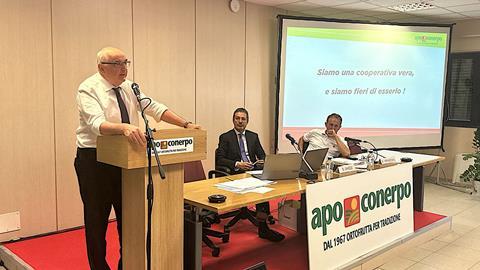Following a year of floods, frosts and crop failures, Italy’s largest fruit and vegetable producer organisation has seen dramatic volume increases across multiple product categories

Italy’s largest fruit and veg producer organisation, Apo Conerpo, says it secured a 13 per cent increase in revenue to €489mn last year, as well as a 34 per cent increase in sold volume to 968,742 tonnes, as it recovered from a disastrous 2023 in which floods, frosts, and crop failures hampered its business.
Following what it described as an annus horribilis, the group said 2024 had seen a return to something “closer to normal”.
Although still affected by geopolitical, climatic and phytosanitary challenges, it said the result demonstrated the resilience and effectiveness of its cooperative model, as well as recent attempts to diversify its offer, manage risk, and strengthen supply chains.
“2024 has finally allowed us to recover production,” commented president Davide Vernocchi, “bringing deliveries back to slightly higher levels than 2018, which we consider the last ‘normal’ year before the climatic and phytosanitary escalation.”
Future success would depend on continued investment in growers, he added. “We cannot speak of an exceptional season, but at least of a newfound basis on which to build new certainties. And we do so with a more compact, more specialised organisation that is increasingly oriented towards providing answers to producers.
“Because today, the real challenge is to allow agricultural companies to continue producing. And to do so, active defence, varietal selection, and a system vision are needed.”
Dramatic turnaround
Last year’s sharp rebound included a 65 per cent increase in fruit volumes sold, alongside a 23 per cent rise for vegetables.
Pear and cherry volumes rose dramatically (+140 per cent and 160 per cent respectively), although that reflected the severe damage that both crops incurred due to poor weather in 2023.
Meanwhile, the group also shipped more apricots (+94 per cent), peaches (+85 per cent), nectarines (+76 per cent) and kiwifruit (+40 per cent).
That growth translated into solid commercial sales. “It’s a result that captures the excellent work of our business units Alegra, Brio, Naturitalia, Opera and Valfrutta Fresco, and their activity on the market in a context of increasingly reduced economic availability of the consumer,” Vernocchi said.
Daniele Ghezzi, general manager of Apo Conerpo, said the group had managed to put itself on a sounder financial footing.
“Alongside the growth in turnover, 2024 also marks an important step in the capital strengthening of our group,” he said. “Over 75 per cent of our resources today are permanently invested within the system, in our branches and in the member cooperatives, while the remaining part is allocated in participations that are consistent and functional to our mission.
“It is a concrete sign of solidity and strategic vision: day after day we are building a structure capable of sustaining our role over time, which is to support producers in ensuring operational continuity, profitability and the possibility of growth even in an unstable context such as the current one. Capitalisation is not an end in itself, but a tool to be increasingly effective in supporting the social base.”
In support of producers
Vernocchi added a note of caution, however. “We must not indulge in self-celebration, but continue to work tenaciously, because the context remains extremely complex: just think of the spread of increasingly aggressive plant diseases… or the pressure of the Asian bug, and the difficulties in phytosanitary defence due to the continuous restriction of available active ingredients.
He also said growers faced increased costs in energy, logistics, and materials, while also contending with retailer residue requirements that often “penalises” producers.
Daniele Ghezzi, the organisation’s general manager, said it remained crucial to provide growers with “adequate protection tools and opportunities” to secure their future.
“Last year, the CMC 2020 mutualisation fund against damage from the Asian bug was refinanced,” he revealed, “bringing its total endowment to over one million euros. It’s a concrete tool, designed to guarantee rapid support to affected companies. At the same time, a great push was given, together with the Emilia-Romagna Region, to the installation of active defence systems.”
He added: “We will continue to invest, innovate and build strong supply chains, capable of facing the future with determination.”








